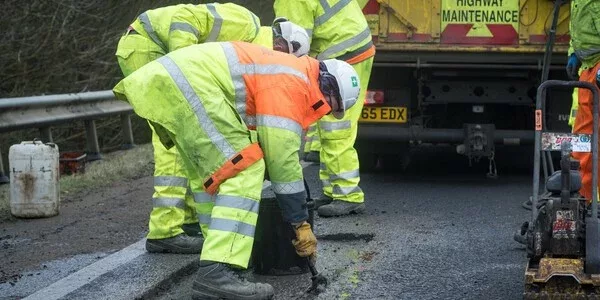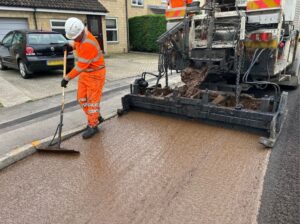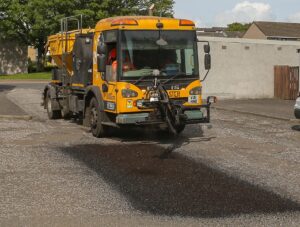A section of a key main road through Wantage in Oxfordshire is being improved in a carbon-neutral project using recycled and sustainable materials along with tree and wildflower planting and solar powered traffic signals.
Oxfordshire County Council, Milestone Infrastructure and their suppliers are working on a large layby/service road on the A417 Reading Road in the town. Work began on 14 August and is scheduled to last for five weeks. Environmentally friendly kerbing, bins, asphalt, bollards and concrete are all part of the scheme.
Councillor Andrew Gant, the county council’s Cabinet Member for Highway Management, said: “This otherwise routine scheme of maintenance and minor improvement provides a unique opportunity to incorporate a variety of innovative solutions in one location, and it serves well to demonstrate Oxfordshire County Council’s commitment to being a leader in sustainable highway maintenance and to put action to tackle climate change at the heart of our work.
“The list of sustainable materials being deployed is impressive and we hope it points the way to a different future in highway repair. My thanks go to our county council officers and their colleagues at Milestone for embracing this fresh way of doing things with one eye on the environment.”
Declan Moss, Operations Manager for Milestone said: “We are excited to take this project forward on behalf of the council; affording our graduate team members an opportunity to research sustainable products as part of their learning. The delivery of the work will be supervised by a graduate engineer in conjunction with our own site agent”.
Material and products listed below form the basis of the project with their sustainable benefits.
- Concrete canvas: Concrete canvas is a flexible, cement-impregnated fabric that hardens when hydrated. It offers rapid, cost-effective, and environmentally friendly solutions for erosion control, ditch lining, and concrete repair. The material comes in rolls, making it easy to transport and install. Its benefits include reduced construction time, minimised environmental impact, and durability in various applications. Concrete Canvas rolls will be used on site to construct drainage grips to allow rainwater to drain from the layby into the adjacent road ditch.
- Tree planting: Trees offer numerous benefits, including improved air quality, carbon sequestration, shade provision, and aesthetic enhancement. They contribute to overall environmental sustainability by promoting biodiversity and providing habitats for various species. After the layby reconstruction is completed, an additional two trees will be planted alongside it.
- Wild flower seedings: These plants require minimal maintenance, promote local biodiversity, attract pollinators, and add aesthetic value to landscapes. Wild flower seedings contribute to the conservation of native plant species and create natural, colourful habitats. Wild flower seeds will be sown along the verge at the end of the project
- Recycled plastic bin: Recycled plastic litter bins are environmentally friendly waste disposal solutions. Made from recycled materials, these bins contribute to plastic waste reduction and promote recycling awareness. They offer durability, resistance to corrosion, and low maintenance requirements. The bin that will be used on the layby is made from 100% recycled plastic chippings from bins that are no longer in use.
- Ultifastpath: Ultifastpath is a high-performance asphalt material designed for rapid road construction and repairs. Its quick-setting properties reduce road closure times, minimising traffic disruptions. Ultifastpath is a faster and simpler alternative to conventional footpath solutions as it replaces the need for a separate binder and surface course by combining the two.
- Sustainable kerbing: The kerbs used in this scheme are made from high-quality aggregates and recycled materials. The kerbs contain up to 48.3% recycled material content. It provides effective edge restraint, aiding pavement stability and preventing surface damage. It offers improved strength and durability while being lighter and more environmentally friendly. Benefits include reduced carbon emissions during production, ease of installation, and longevity, resulting in lower maintenance costs.
- TMP Bio-polymer bollard: TMP bio-polymer bollards are eco-friendly alternatives to traditional bollards made from petroleum-based materials. These bollards are crafted from renewable bio-polymers, reducing their carbon footprint. Their benefits include biodegradability, reduced dependence on fossil fuels, and a positive impact on environmental conservation.
- Solar powered temporary traffic signals: Solar powered temporary traffic signals use solar energy to power traffic control signals at construction or maintenance sites. These signals are eco-friendly, reducing the need for conventional power sources and minimising carbon emissions. Their benefits include cost savings on energy, reduced environmental impact, and improved traffic management.
- Warm mix asphalt: Warm mix asphalt is an innovative asphalt mixture that is produced and laid at lower temperatures compared to traditional hot mix asphalt. This technology offers several benefits, including reduced energy consumption during production, lower emissions of greenhouse gases and pollutants, improved workability, and a longer construction season due to lower temperature requirements. Additionally, warm mix asphalt can contribute to enhanced pavement performance and durability.
- CEM free concrete: CEM (cement) free concrete is a concrete mixture that significantly reduces or eliminates the use of traditional Portland cement. It employs alternative cementitious materials or binders, such as fly ash, slag, or natural pozzolans. Benefits of CEM-free concrete include reduced carbon emissions from cement production, decreased reliance on non-renewable resources, and potentially improved long-term durability and performance. This innovative approach aligns with sustainability goals and environmental stewardship.
























